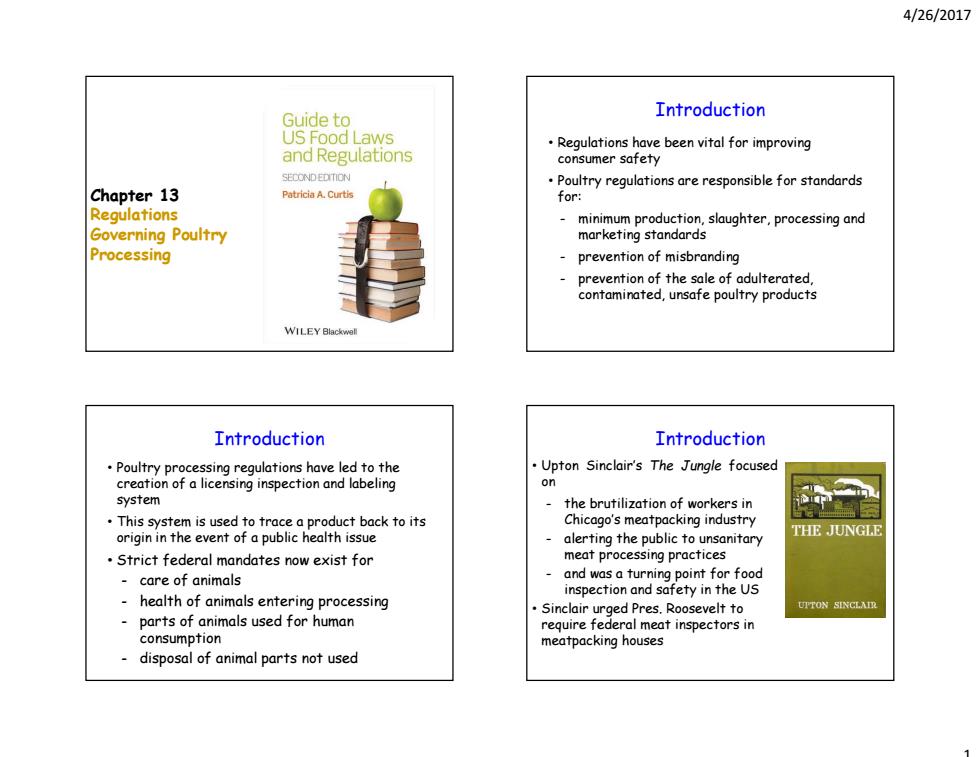
4/26/2017 Guide to Introduction US Food Laws .Regulations have been vital for improving and Regulations consumer safety SECONDEDITION .Poultry regulations are responsible for standards Chapter 13 PatriciaA.Curtis for: Regulations minimum production,slaughter,processing and Governing Poultry marketing standards Processing prevention of misbranding prevention of the sale of adulterated, contaminated,unsafe poultry products WILEY Blackwel Introduction Introduction Poultry processing regulations have led to the Upton Sinclair's The Jungle focused creation of a licensing inspection and labeling on system the brutilization of workers in This system is used to trace a product back to its Chicago's meatpacking industry origin in the event of a public health issue alerting the public to unsanitary THE JUNGLE Strict federal mandates now exist for meat processing practices care of animals and was a turning point for food inspection and safety in the US health of animals entering processing Sinclair urged Pres.Roosevelt to , parts of animals used for human require federal meat inspectors in consumption meatpacking houses disposal of animal parts not used
4/26/2017 1 Chapter 13 Regulations Governing Poultry Processing Introduction • Regulations have been vital for improving consumer safety • Poultry regulations are responsible for standards for: - minimum production, slaughter, processing and marketing standards - prevention of misbranding - prevention of the sale of adulterated, contaminated, unsafe poultry products Introduction • Poultry processing regulations have led to the creation of a licensing inspection and labeling system • This system is used to trace a product back to its origin in the event of a public health issue • Strict federal mandates now exist for - care of animals - health of animals entering processing - parts of animals used for human consumption - disposal of animal parts not used Introduction • Upton Sinclair’s The Jungle focused on - the brutilization of workers in Chicago’s meatpacking industry - alerting the public to unsanitary meat processing practices - and was a turning point for food inspection and safety in the US • Sinclair urged Pres. Roosevelt to require federal meat inspectors in meatpacking houses
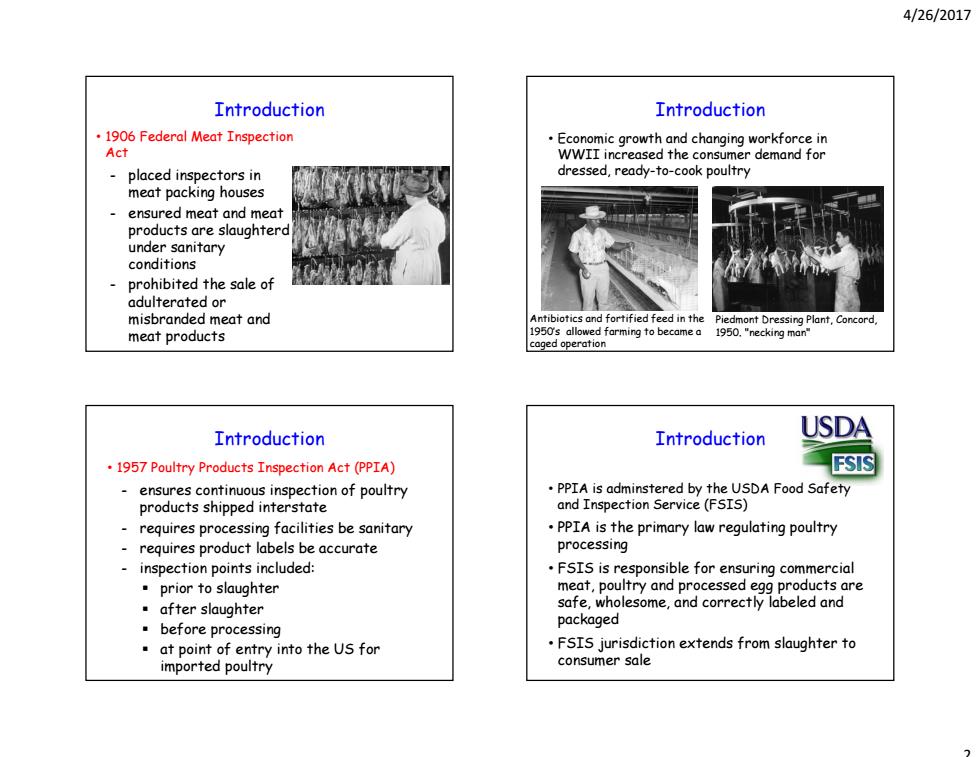
4/26/2017 Introduction Introduction 1906 Federal Meat Inspection .Economic growth and changing workforce in Act WWII increased the consumer demand for placed inspectors in dressed,ready-to-cook poultry meat packing houses ensured meat and meat products are slaughterd under sanitary conditions 、 prohibited the sale of adulterated or misbranded meat and Antibiotics and fortified feed in the Piedmont Dressing Plant,Concord, meat products 1950's allowed farming to became a 1950."necking man" caged operation Introduction Introduction USDA 1957 Poultry Products Inspection Act(PPIA) FSIS ensures continuous inspection of poultry PPIA is adminstered by the USDA Food Safety products shipped interstate and Inspection Service(FSIS) requires processing facilities be sanitary PPIA is the primary law regulating poultry requires product labels be accurate processing inspection points included: FSIS is responsible for ensuring commercial prior to slaughter meat,poultry and processed egg products are after slaughter safe,wholesome,and correctly labeled and ·before processing packaged at point of entry into the US for FSIS jurisdiction extends from slaughter to imported poultry consumer sale
4/26/2017 2 Introduction • 1906 Federal Meat Inspection Act - placed inspectors in meat packing houses - ensured meat and meat products are slaughterd under sanitary conditions - prohibited the sale of adulterated or misbranded meat and meat products Introduction • Economic growth and changing workforce in WWII increased the consumer demand for dressed, ready-to-cook poultry Piedmont Dressing Plant, Concord, 1950. "necking man" Antibiotics and fortified feed in the 1950’s allowed farming to became a caged operation Introduction • 1957 Poultry Products Inspection Act (PPIA) - ensures continuous inspection of poultry products shipped interstate - requires processing facilities be sanitary - requires product labels be accurate - inspection points included: prior to slaughter after slaughter before processing at point of entry into the US for imported poultry Introduction • PPIA is adminstered by the USDA Food Safety and Inspection Service (FSIS) • PPIA is the primary law regulating poultry processing • FSIS is responsible for ensuring commercial meat, poultry and processed egg products are safe, wholesome, and correctly labeled and packaged • FSIS jurisdiction extends from slaughter to consumer sale
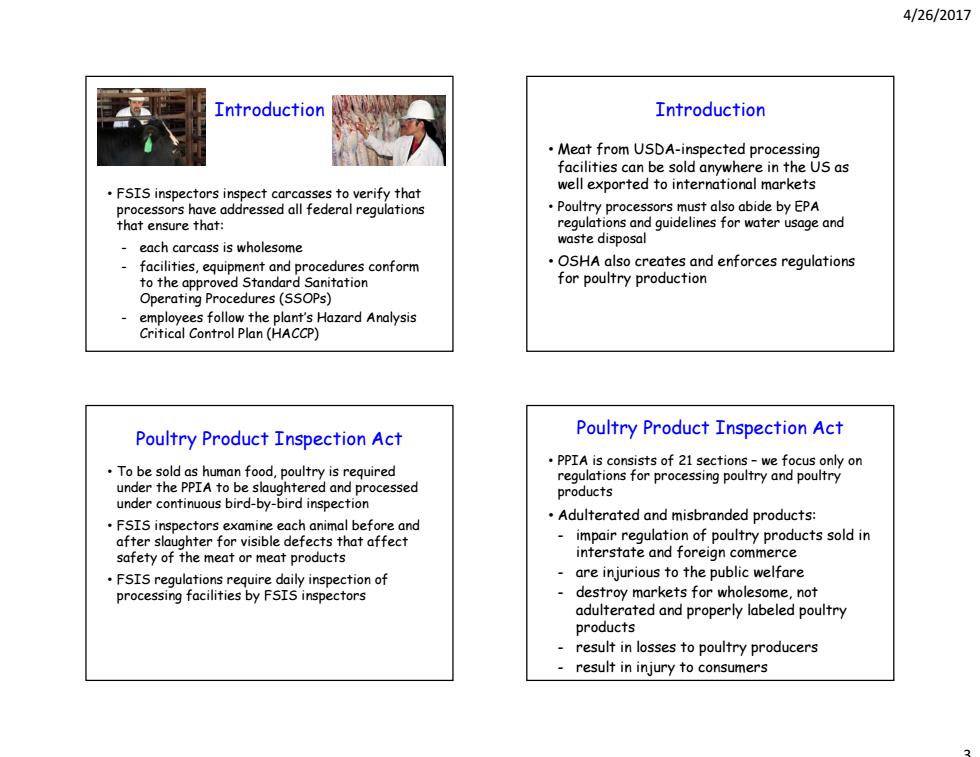
4/26/2017 Introduction Introduction Meat from USDA-inspected processing facilities can be sold anywhere in the US as FSIS inspectors inspect carcasses to verify that well exported to international markets processors have addressed all federal regulations Poultry processors must also abide by EPA that ensure that: regulations and guidelines for water usage and each carcass is wholesome waste disposal facilities,equipment and procedures conform OSHA also creates and enforces regulations to the approved Standard Sanitation for poultry production Operating Procedures(SSOPs) employees follow the plant's Hazard Analysis Critical Control Plan(HACCP) Poultry Product Inspection Act Poultry Product Inspection Act To be sold as human food,poultry is required PPIA is consists of 21 sections-we focus only on regulations for processing poultry and poultry under the PPIA to be slaughtered and processed products under continuous bird-by-bird inspection FSIS inspectors examine each animal before and Adulterated and misbranded products: after slaughter for visible defects that affect impair regulation of poultry products sold in safety of the meat or meat products interstate and foreign commerce FSIS regulations require daily inspection of are injurious to the public welfare processing facilities by FSIS inspectors destroy markets for wholesome,not adulterated and properly labeled poultry products result in losses to poultry producers result in injury to consumers
4/26/2017 3 Introduction • FSIS inspectors inspect carcasses to verify that processors have addressed all federal regulations that ensure that: - each carcass is wholesome - facilities, equipment and procedures conform to the approved Standard Sanitation Operating Procedures (SSOPs) - employees follow the plant’s Hazard Analysis Critical Control Plan (HACCP) Introduction • Meat from USDA-inspected processing facilities can be sold anywhere in the US as well exported to international markets • Poultry processors must also abide by EPA regulations and guidelines for water usage and waste disposal • OSHA also creates and enforces regulations for poultry production Poultry Product Inspection Act • To be sold as human food, poultry is required under the PPIA to be slaughtered and processed under continuous bird-by-bird inspection • FSIS inspectors examine each animal before and after slaughter for visible defects that affect safety of the meat or meat products • FSIS regulations require daily inspection of processing facilities by FSIS inspectors Poultry Product Inspection Act • PPIA is consists of 21 sections – we focus only on regulations for processing poultry and poultry products • Adulterated and misbranded products: - impair regulation of poultry products sold in interstate and foreign commerce - are injurious to the public welfare - destroy markets for wholesome, not adulterated and properly labeled poultry products - result in losses to poultry producers - result in injury to consumers
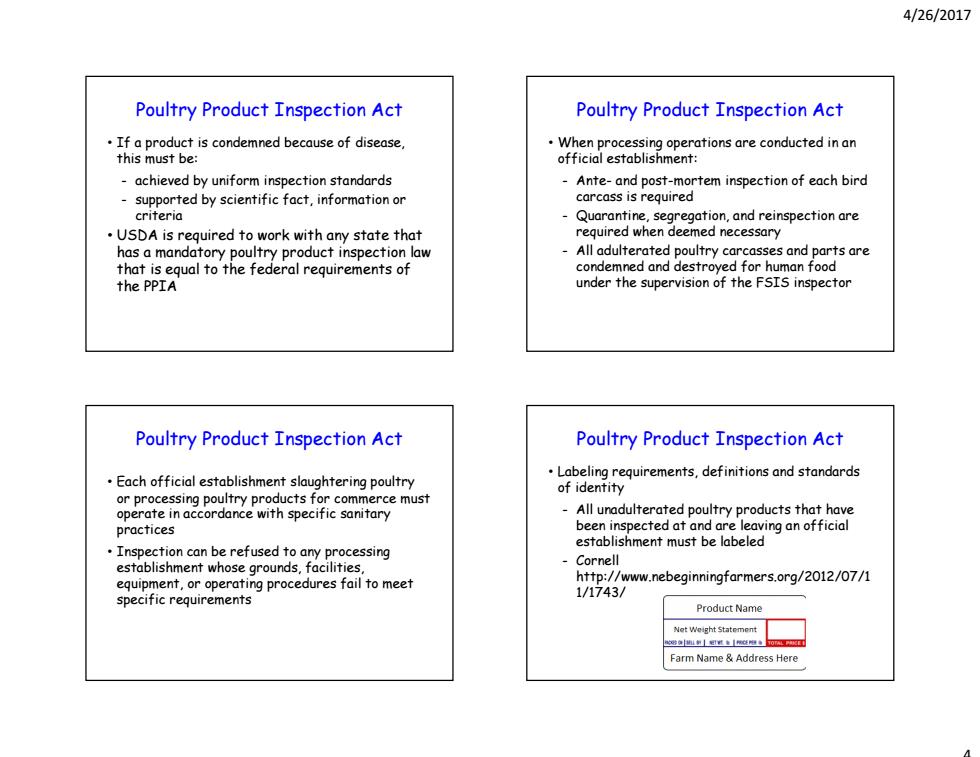
4/26/2017 Poultry Product Inspection Act Poultry Product Inspection Act If a product is condemned because of disease When processing operations are conducted in an this must be: official establishment: -achieved by uniform inspection standards -Ante-and post-mortem inspection of each bird supported by scientific fact,information or carcass is required criteria Quarantine,segregation,and reinspection are USDA is required to work with any state that required when deemed necessary has a mandatory poultry product inspection law All adulterated poultry carcasses and parts are that is equal to the federal requirements of condemned and destroyed for human food the PPIA under the supervision of the FSIS inspector Poultry Product Inspection Act Poultry Product Inspection Act Each official establishment slaughtering poultry Labeling requirements,definitions and standards or processing poultry products for commerce must of identity operate in accordance with specific sanitary -All unadulterated poultry products that have practices been inspected at and are leaving an official establishment must be labeled Inspection can be refused to any processing establishment whose grounds,facilities, Cornell equipment,or operating procedures fail to meet http://www.nebeginningfarmers.org/2012/07/1 specific requirements 1/1743/ Product Name Farm Name Address Here
4/26/2017 4 Poultry Product Inspection Act • If a product is condemned because of disease, this must be: - achieved by uniform inspection standards - supported by scientific fact, information or criteria • USDA is required to work with any state that has a mandatory poultry product inspection law that is equal to the federal requirements of the PPIA Poultry Product Inspection Act • When processing operations are conducted in an official establishment: - Ante- and post-mortem inspection of each bird carcass is required - Quarantine, segregation, and reinspection are required when deemed necessary - All adulterated poultry carcasses and parts are condemned and destroyed for human food under the supervision of the FSIS inspector Poultry Product Inspection Act • Each official establishment slaughtering poultry or processing poultry products for commerce must operate in accordance with specific sanitary practices • Inspection can be refused to any processing establishment whose grounds, facilities, equipment, or operating procedures fail to meet specific requirements Poultry Product Inspection Act • Labeling requirements, definitions and standards of identity - All unadulterated poultry products that have been inspected at and are leaving an official establishment must be labeled - Cornell http://www.nebeginningfarmers.org/2012/07/1 1/1743/
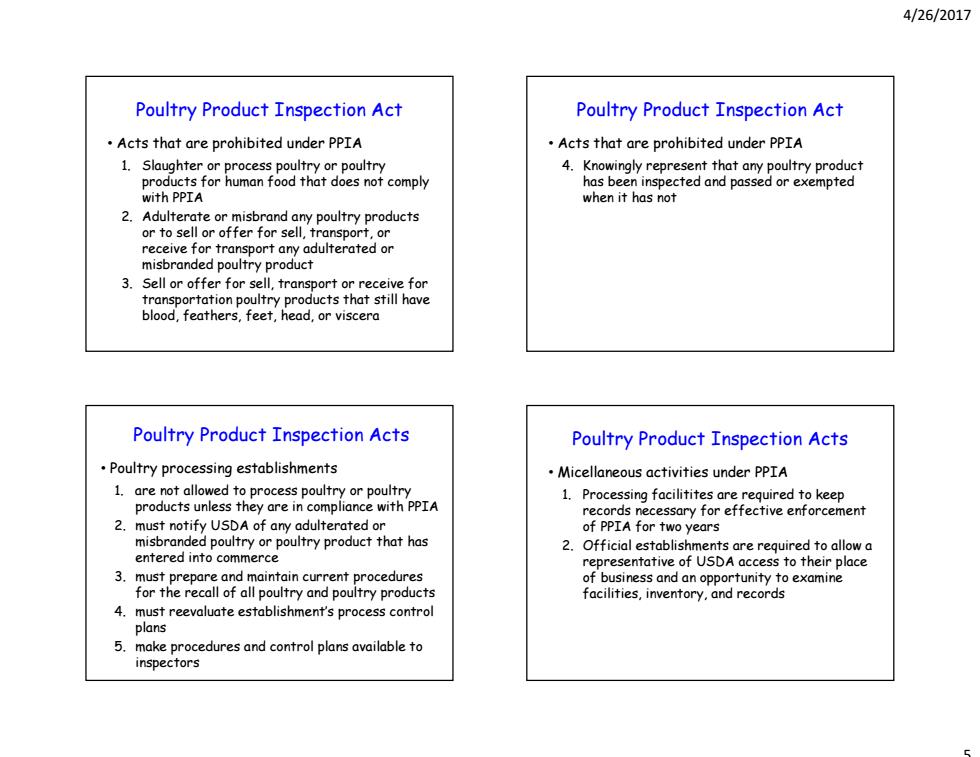
4/26/2017 Poultry Product Inspection Act Poultry Product Inspection Act Acts that are prohibited under PPIA Acts that are prohibited under PPIA 1.Slaughter or process poultry or poultry 4.Knowingly represent that any poultry product products for human food that does not comply has been inspected and passed or exempted with PPIA when it has not 2.Adulterate or misbrand any poultry products or to sell or offer for sell,transport,or receive for transport any adulterated or misbranded poultry product 3.Sell or offer for sell,transport or receive for transportation poultry products that still have blood,feathers,feet,head,or viscera Poultry Product Inspection Acts Poultry Product Inspection Acts Poultry processing establishments Micellaneous activities under PPIA 1.are not allowed to process poultry or poultry 1.Processing facilitites are required to keep products unless they are in compliance with PPIA records necessary for effective enforcement 2.must notify USDA of any adulterated or of PPIA for two years misbranded poultry or poultry product that has 2.Official establishments are required to allow a entered into commerce representative of USDA access to their place 3.must prepare and maintain current procedures of business and an opportunity to examine for the recall of all poultry and poultry products facilities,inventory,and records 4.must reevaluate establishment's process control plans 5.make procedures and control plans available to inspectors
4/26/2017 5 Poultry Product Inspection Act • Acts that are prohibited under PPIA 1. Slaughter or process poultry or poultry products for human food that does not comply with PPIA 2. Adulterate or misbrand any poultry products or to sell or offer for sell, transport, or receive for transport any adulterated or misbranded poultry product 3. Sell or offer for sell, transport or receive for transportation poultry products that still have blood, feathers, feet, head, or viscera Poultry Product Inspection Act • Acts that are prohibited under PPIA 4. Knowingly represent that any poultry product has been inspected and passed or exempted when it has not Poultry Product Inspection Acts • Poultry processing establishments 1. are not allowed to process poultry or poultry products unless they are in compliance with PPIA 2. must notify USDA of any adulterated or misbranded poultry or poultry product that has entered into commerce 3. must prepare and maintain current procedures for the recall of all poultry and poultry products 4. must reevaluate establishment’s process control plans 5. make procedures and control plans available to inspectors Poultry Product Inspection Acts • Micellaneous activities under PPIA 1. Processing facilitites are required to keep records necessary for effective enforcement of PPIA for two years 2. Official establishments are required to allow a representative of USDA access to their place of business and an opportunity to examine facilities, inventory, and records